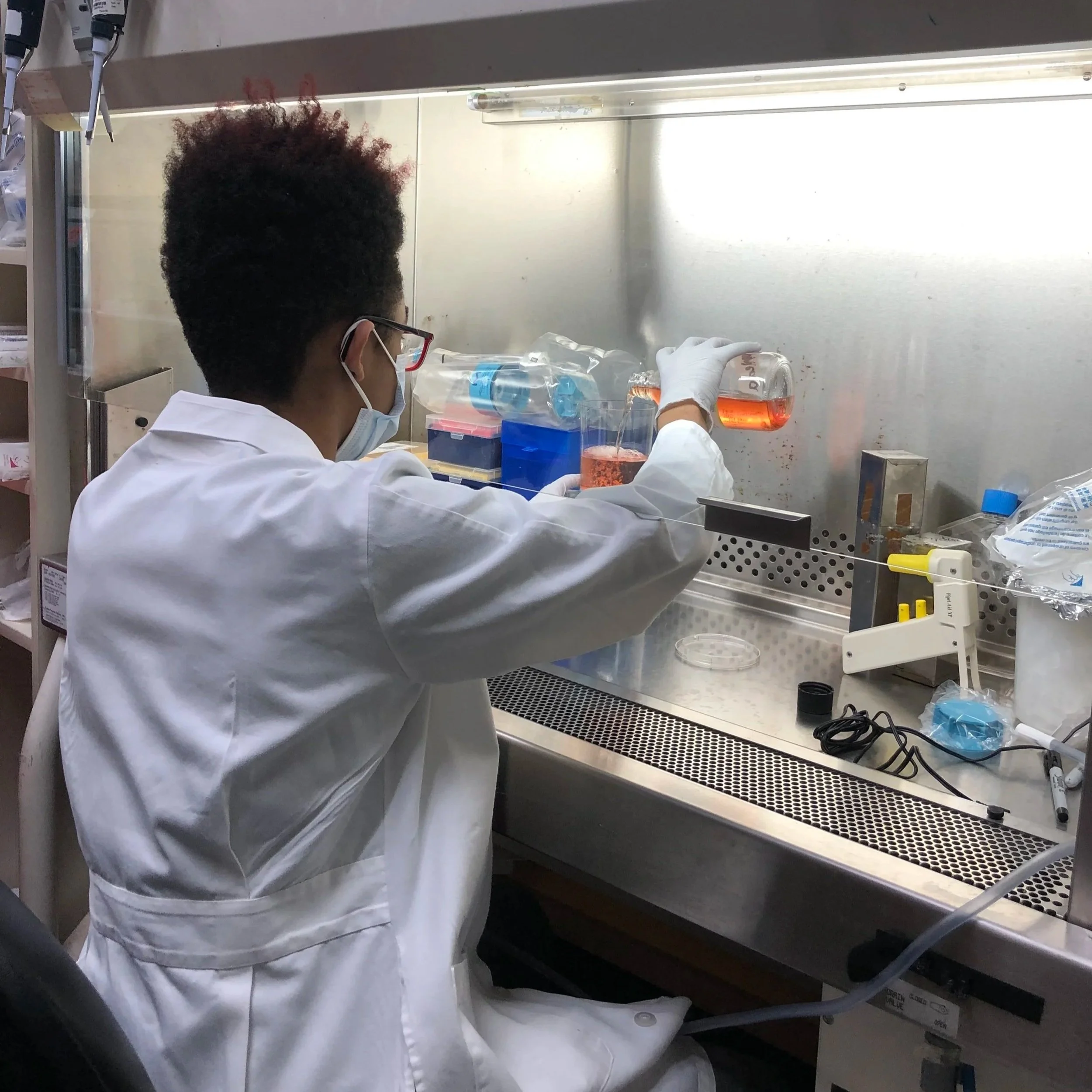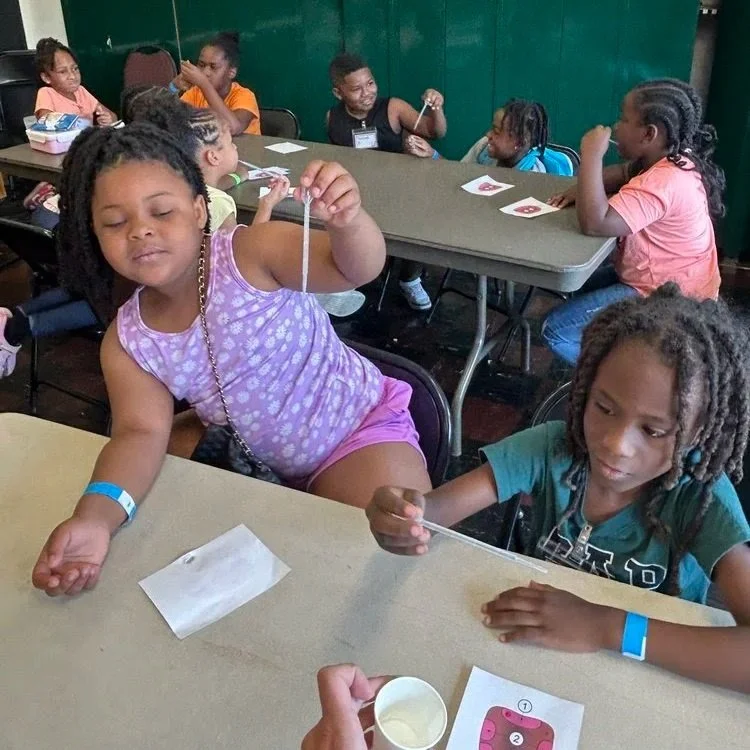July 2025
Kemuel working in the lab
Alumni interview
This month, we’re thrilled to highlight Kemuel Cruz with an interview as he begins his transition to college life! Kemuel completed our Life as a Scientist program in 2023, where he researched the effects of artificial sweeteners using C. elegans as a model organism. He was also a Rise Up Scholar, working in the Tesar Lab at Case Western Reserve University.
Kemuel recently graduated from Lincoln-West School of Science and Health—a year ahead of schedule—as class salutatorian. He is a 2025 Governor’s Merit Scholarship awardee and a deeply involved contributor to his community. This fall, Kemuel will attend Kent State University to study zoology.
Can you tell us a little about yourself: where you’re from, what brought you to science, and what excites you about your future?
I was born and raised in Cleveland, Ohio. I got into science at a young age through my obsession with dinosaurs and wildlife. I’m excited about the future because I’ll get to dive deeper into my love for wildlife and help protect the animals we share this planet with.
What were your thoughts about science or college growing up, or at the beginning of high school?
Growing up, I knew nothing about high school, college, or science careers—neither of my parents graduated from high school, so I was basically going in blind.
A lot of people see successful students like you earning prestigious scholarships and assume there were never tough times. What challenges have you faced—in school, life, or access to opportunity—that most people don’t see?
One of the biggest challenges I faced was the journey it took to graduate. My mental health wasn’t in the best place when I started, and it took a lot of effort—and help—to get me out of my shell. But I still made it, and I credit part of that to this program.
What do you remember about your first day in the lab during the Rise Up internship? What surprised you?
It was awesome. I had never been in or even seen a lab before. I remember doing a lot of walking and following people around. I got to see so much cool equipment. What really surprised me was how close this place was to me the whole time.
Was there a moment during the program that shifted your thinking about science, college, or your own potential?
It didn’t change how I felt about science—it propelled it. If I just liked it before, after this program, I loved it. It opened my eyes to what’s possible and helped me realize how much I enjoy research. I also found out how much I enjoy showing people the results of my work. That helped me decide to go to college and study zoology. I even saw Marissa and Andrew at my graduation celebration!
How did being a paid intern change the way you could participate in this opportunity?
Being a paid intern was really encouraging—it made me feel valued, even as just a high school student.
You just graduated high school—congratulations! What are you studying in college, and what are your goals?
Since graduation, I’ve been preparing to attend Kent State University, where I’ll study zoology.
What does representation mean to you in the world of science and medicine?
To me, representation means the ability to exemplify and stand for something. It’s about taking pride in how someone reflects you and your community. I’ve always been interested in science, but after this program, I realized it’s truly where I belong. It feels like science wants me just as much as I want it.
What would you say to a student who doesn’t think they’re “smart enough” for a lab like this?
For people who think they aren’t smart enough—learning doesn’t have intelligence requirements. This program is here to help you learn and enjoy science, so don’t feel like you’re not good enough. They don’t require any proof that you’re smart—they just want your dedication and passion. Programs like this help bring out the love and excitement in people.
Lab selfie!
Aaliyah teaching students about cells!
Open Doors Academy
We were thrilled to welcome over 400 curious and enthusiastic young students to our summer sessions at Archbishop Lyke School in Cleveland, hosted in partnership with Open Doors Academy! We have now attended these amazing, free summer camps put on by ODA for 4 years and it has been a pleasure. Throughout the month of July, we worked with rising 1st through 5th graders in a hands-on classroom setting designed to spark early interest in science.
Students explored topics like cells, organs, taste, smell, and DNA through interactive lessons led by local scientists and volunteers. One of the highlights was a DNA isolation activity, complete with pipettes, microscopes, and our mock lab bench—giving students the chance to step into the role of a scientist for the day. They also learned how the tongue and nose work together to create the sense of taste, using basic taste solutions and a fun jellybean trick to show how the brain combines sensory input.
This experience wasn’t just about learning facts—it was about fostering curiosity and planting the seeds of scientific curiosity. We hope these young minds left inspired and excited to keep asking questions, testing ideas, and exploring the world around them—because at the heart of science is curiosity.
Tongue mapping activity
Support research
We are saddened and dismayed by the proposed funding cuts to the National Institutes of Health and National Science Foundation. Continued federal budget cuts would weaken the science that powers our health, technology, future careers, and economic prosperity. These cuts impact scientists working right here in our own communities and that volunteer their time with Rise Up: Northeast Ohio. Biomedical research is a public good that should be funded and support properly.
If you agree you can join us in fighting back. Please consider using this quick and easy tool from 5 Calls to contact your representatives and urge them to protect NIH and NSF funding.
Let’s stand together for science, education, and the future.




